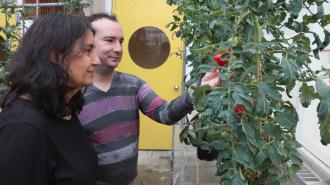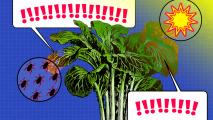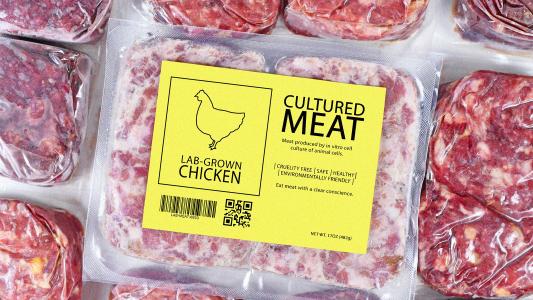Researchers have discovered that a mutated tomato breed, known to botanists for decades, is highly resilient against a notorious plant disease. Breeding this trait into other types of crop could one day help to improve global food security.
The challenge: The world’s most important crops face a constant barrage of threats: from insect and fungi attacks to droughts, floods, and heatwaves. While crop resilience can be improved using pesticides or genetic modification, both can raise thorny issues and public opposition.
Far less controversial is looking for naturally occurring mutations in crops which make them less vulnerable to disease and weather stress. If these traits can be identified, they could then be encouraged to spread through selective breeding.
Unfortunately, such useful mutations are rarely easy to spot. Since there are so many factors in play when determining a crop’s resilience, it is challenging to single out a particular gene for its role in a successful harvest.
A potentially groundbreaking trait may have been hiding in its mutated DNA.
The mutant: In the 1950s, botanists noticed a mutation in one breed of tomato that completely changed the way the plant grew. Instead of reaching upwards like a regular tomato plant, one mutant tomato breed, named adpressa, tends to lie close to the ground. For decades, this behaviour was an interesting curiosity to botanists, but was never seen as particularly useful.
Now, an international team of researchers has discovered a potentially groundbreaking trait, which may have been hiding in adpressa’s mutated DNA all along.
The disease: Along with several other important fruits and veg, including peppers, eggplants, and watermelons, tomatoes are vulnerable to a disorder named “blossom-end rot” (BER). It causes dark, sunken lesions to form at the bottom of the fruit, making them inedible.
BER is caused by a deficiency in calcium, which can be triggered by a variety of environmental factors, and are often difficult to control. These could include inconsistent water, root damage from pests, or high salt content in the soil.
Biochemical defence: Researchers led by Carmen Catalá at the Boyce Thompson Institute in Ithaca, New York, were looking into potential mutations that may protect plants from BER, and they discovered the adpressa variety is far more resistant to BER than other tomato plants.
The change helps the tomato withstand stressful conditions that would have triggered blossom-end rot in unmutated plants.
Key to this resilience is a piece of mutated genetic code that stops adpressa from producing its own starch, a type of sugar. Typically, starch is used to store carbon early in the plant’s development to use later on during ripening. But when its production is blocked, the plant instead stores its carbon in other types of sugar, completely reshuffling the biochemical reactions taking place inside.
Remarkably, Catalá’s team found that this change helps adpressa withstand stressful conditions which would have triggered BER in unmutated plants — all with minimal effects on the size and ripening of its fruits.
Expanding the search: For now, the team still aren’t sure exactly how the reshuffling of biochemistry is connected to its improved resilience. In their upcoming research, they now hope to pin down the specific pathways responsible for adpressa’s resistance to BER.
If these changes can be reproduced in other tomato breeds, they also hope that this vital crop will become better adapted to withstand future climate challenges.
More broadly, Catalá and colleagues will explore whether similar traits have also emerged in other crops, and whether they might also be more resilient against other stress-related diseases. Exploiting these mutations could one day become a vital measure for global food security, and ensuring the fruits and veg we love today will remain reliable parts of our dinners.
We’d love to hear from you! If you have a comment about this article or if you have a tip for a future Freethink story, please email us at [email protected].






